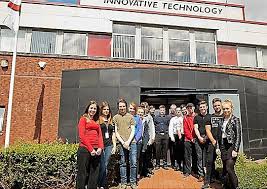Innovative Technology: Shaping the Future
In today’s rapidly evolving world, innovative technology is at the forefront of transforming industries and enhancing everyday life. From artificial intelligence to blockchain, these advancements are not only revolutionising the way we work and live but also paving the way for a more connected and efficient future.
The Rise of Artificial Intelligence (AI)
Artificial intelligence has quickly become one of the most influential technologies in recent years. AI algorithms are now capable of performing tasks that once required human intelligence, such as recognising speech, making decisions, and even diagnosing medical conditions. The integration of AI into various sectors is streamlining operations, improving accuracy, and opening new avenues for innovation.
Applications in Healthcare
In healthcare, AI-powered systems are assisting doctors in diagnosing diseases with greater precision. For instance, machine learning models can analyse medical images to detect anomalies that might be missed by the human eye. Additionally, AI-driven chatbots are providing patients with instant support and information, improving access to healthcare services.
Transforming Industries
The impact of AI extends beyond healthcare. In finance, AI algorithms are used for fraud detection and personalised banking experiences. In manufacturing, predictive maintenance powered by AI helps in reducing downtime and increasing efficiency. The potential applications are vast and continue to grow as technology advances.
Blockchain: Beyond Cryptocurrency
While blockchain technology is often associated with cryptocurrencies like Bitcoin, its potential goes far beyond digital currencies. Blockchain offers a decentralised and secure method for recording transactions, which has significant implications for various industries.
Supply Chain Management
One notable application is in supply chain management. By utilising blockchain technology, companies can achieve greater transparency and traceability in their supply chains. This ensures that products are sourced ethically and reduces the risk of counterfeiting.
Smart Contracts
Another innovative use of blockchain is smart contracts—self-executing contracts with the terms directly written into code. These contracts automatically enforce agreements when predefined conditions are met, reducing the need for intermediaries and speeding up transactions.
The Internet of Things (IoT)
The Internet of Things refers to a network of interconnected devices that communicate with each other to collect and exchange data. This technology is creating smarter homes, cities, and industries by enabling real-time monitoring and control over various systems.
Smart Homes
In smart homes, IoT devices such as thermostats, lights, and security systems can be controlled remotely via smartphones or voice assistants like Amazon Alexa or Google Assistant. This not only enhances convenience but also improves energy efficiency.
Sustainable Cities
Cities around the world are leveraging IoT to become more sustainable. Smart sensors monitor air quality, traffic flow, and energy usage to optimise resources and reduce environmental impact. IoT-enabled waste management systems ensure timely collection and recycling efforts.
The Future Ahead
The pace at which innovative technology is advancing shows no signs of slowing down. As these technologies continue to evolve, they will bring about even more profound changes across all aspects of life—from how we interact with our environment to how businesses operate on a global scale.
Embracing these innovations responsibly will be key to unlocking their full potential while addressing challenges such as data privacy concerns and ethical considerations. With continued research and collaboration across sectors, innovative technology will undoubtedly shape a brighter future for all.
Top 5 Benefits of Innovative Technology in Modern Industries
- Enhances efficiency and productivity in various industries.
- Improves accuracy and precision in tasks that were once time-consuming.
- Opens up new opportunities for automation and streamlining processes.
- Facilitates better decision-making through data-driven insights.
- Promotes continuous innovation and drives economic growth.
Challenges of Innovative Technology: Privacy, Inequality, Dependence, Job Loss, Environmental Harm, and Security Risks
- 1. Privacy Concerns
- 2. Digital Divide
- 3. Dependence on Technology
- 4. Job Displacement
- 5. Environmental Impact
- 6. Security Vulnerabilities
Enhances efficiency and productivity in various industries.
Innovative technology has significantly enhanced efficiency and productivity across various industries. Through automation, data analysis, and streamlined processes, businesses can achieve higher levels of output with reduced time and resources. Tasks that once required manual effort can now be completed swiftly and accurately with the help of advanced technologies, leading to increased efficiency and overall productivity. This transformation not only benefits organisations by improving their bottom line but also empowers employees to focus on more strategic tasks that drive innovation and growth.
Improves accuracy and precision in tasks that were once time-consuming.
Innovative technology has significantly enhanced accuracy and precision in tasks that were previously time-consuming and prone to human error. With the integration of advanced algorithms and automation processes, repetitive and complex tasks can now be completed with unparalleled efficiency and consistency. This not only saves valuable time but also ensures a higher level of precision, leading to improved outcomes across various industries and sectors.
Opens up new opportunities for automation and streamlining processes.
Innovative technology has the remarkable ability to open up new opportunities for automation and streamlining processes in various industries. By harnessing cutting-edge tools such as artificial intelligence and robotics, organisations can automate repetitive tasks, enhance efficiency, and free up valuable time for employees to focus on more strategic and creative endeavours. This not only improves productivity but also enables businesses to adapt quickly to changing market demands, ultimately driving growth and competitiveness in today’s dynamic landscape.
Facilitates better decision-making through data-driven insights.
Innovative technology offers a significant advantage by facilitating better decision-making through data-driven insights. By harnessing the power of advanced analytics and artificial intelligence, organisations can extract valuable information from vast datasets to gain deeper understanding and foresight. This enables businesses to make informed decisions based on real-time trends, patterns, and predictions, ultimately leading to improved efficiency, strategic planning, and competitive edge in today’s fast-paced digital landscape.
Promotes continuous innovation and drives economic growth.
Innovative technology serves as a catalyst for continuous innovation and plays a pivotal role in driving economic growth. By constantly pushing the boundaries of what is possible, new technologies spark creativity and inspire further advancements across industries. This cycle of innovation not only leads to the development of cutting-edge products and services but also creates new opportunities for businesses to thrive and expand. As companies embrace and invest in innovative technologies, they contribute to job creation, increased productivity, and overall economic prosperity, shaping a dynamic landscape that fosters progress and prosperity.
1. Privacy Concerns
Privacy concerns are a significant con associated with innovative technology. The rapid advancement of technology has led to increased collection and storage of personal data, raising questions about how this information is used and protected. From social media platforms to smart devices, the potential for data breaches and misuse of personal information is a growing concern. As technology continues to evolve, addressing these privacy challenges becomes crucial to safeguarding individuals’ sensitive data and maintaining trust in the digital landscape.
2. Digital Divide
The digital age has brought about a significant con in the form of the digital divide. Not everyone has equal access to innovative technology, leading to a widening gap between those who can fully benefit from technological advancements and those who are left behind. This disparity in access to technology can exacerbate existing inequalities, limiting opportunities for education, employment, and social inclusion. Bridging this digital gap is crucial to ensure that everyone has the chance to participate in and reap the benefits of our increasingly digital world.
3. Dependence on Technology
Dependence on technology poses a significant con of innovative technology as it can result in diminished critical thinking skills and interpersonal communication abilities. Relying excessively on technological solutions may hinder individuals’ capacity to think critically, problem-solve independently, and adapt to unforeseen challenges. Moreover, the prevalence of digital communication tools and social media platforms can erode face-to-face interactions, potentially weakening essential interpersonal skills such as empathy, active listening, and conflict resolution. Striking a balance between leveraging the benefits of innovative technology and nurturing traditional cognitive and social capabilities is crucial to ensure holistic personal development in an increasingly tech-driven world.
4. Job Displacement
The advent of automation and AI technologies, while driving efficiency and innovation, also presents significant challenges in the form of job displacement. As machines and intelligent systems increasingly take over tasks that were once performed by humans, there is a growing concern about the potential loss of employment opportunities for many workers. This shift can lead to economic instability and exacerbate inequalities, particularly affecting those in roles that are highly susceptible to automation. Consequently, it becomes imperative for governments and organisations to invest in reskilling and upskilling programmes to help displaced workers transition into new roles within the evolving job market.
5. Environmental Impact
The environmental impact of innovative technology is a significant concern, particularly regarding the production and disposal of electronic devices. The rapid pace of technological advancement leads to a higher turnover rate of gadgets, resulting in increased electronic waste (e-waste) that poses a threat to the environment. Improper disposal methods can lead to pollution, resource depletion, and harmful chemicals leaching into soil and water sources, contributing to environmental degradation. Addressing this con requires sustainable practices in manufacturing, recycling initiatives, and consumer awareness to minimise the negative impact on our planet.
6. Security Vulnerabilities
One significant drawback of innovative technology is the presence of security vulnerabilities that can be exploited by hackers. These vulnerabilities pose a serious threat, leading to potential cyber attacks and system breaches. As new technologies emerge and evolve, they may not always have robust security measures in place, making them susceptible to malicious activities that can compromise sensitive data and disrupt operations. It is crucial for organisations and individuals alike to remain vigilant and proactive in addressing these security risks to safeguard against potential threats in the digital landscape.



